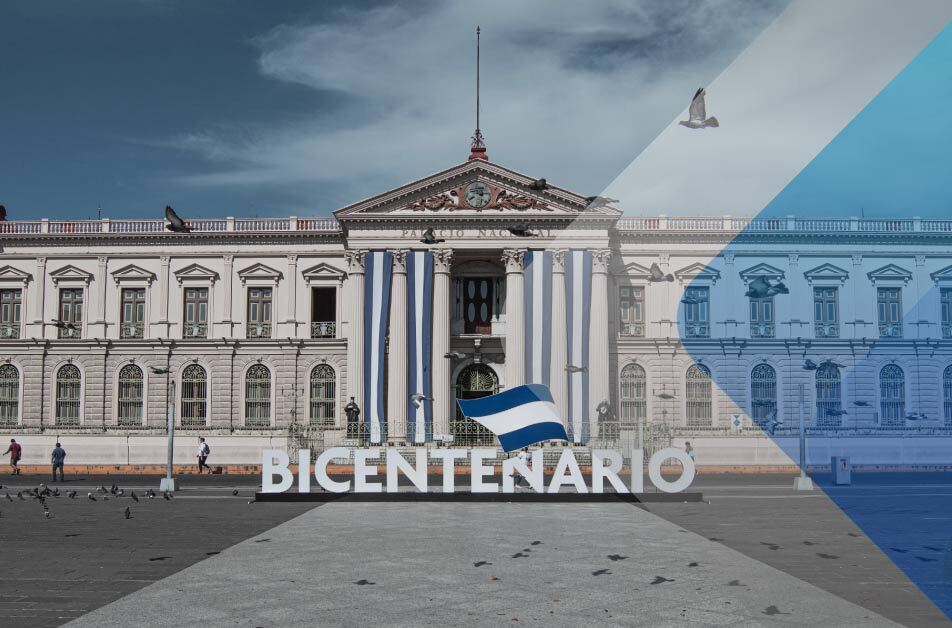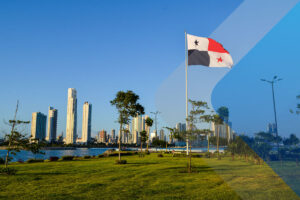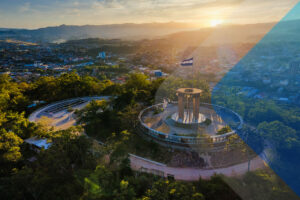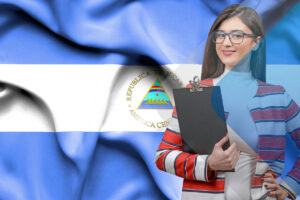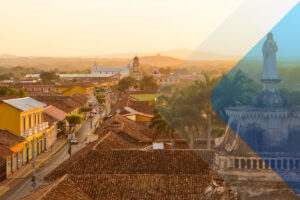Employer of record in Nicaragua
We make it easy and painless to expand your business into Nicaragua. Forget about dealing with local regulations, confusing tax laws and international payroll management. We take care of all that so you don't have to.
Accelerate your growth into Nicaragua compliantly and hassle-free
How we can help you expand in Nicaragua
As your EOR in Nicaragua we’d help you expand by hiring employees and running their payroll without establishing a local branch office or subsidiary.
Your candidate is hired by a PEO in Nicaragua provider in accordance with local labor laws and can be onboarded in days instead of the months it typically takes. Shortly after, your new employee will be working for you, just like any other member of your team.
Expand to Nicaragua with Serviap Global
Through our PEO and EOR services, you can hire qualified talent in your industry without the trouble of opening your own legal entity.
In just a few days, you can easily and safely build a presence in Nicaragua being sure that your staff will be hired in compliance with labor and tax regulations
Quick facts
Currency:
Nicaraguan Córdoba (NIO)
Capital:
Managua
Payroll Cycle:
Monthly
Language:
Spanish
The economy
Nicaragua’s economy has improved in recent years. It is one of the safest places to do business, and it is one of the fastest growing countries in Latin America. A third of its labor force works in agriculture and the country relies on agricultural exports. The major crops are corn, rice, beans, and plantains.
Another significant source is the cattle and livestock industry. Ranching and farming have cleared a lot of forest areas. Nicaragua also has an abundance of resources related to fish, but it is relatively unexploited.
Nicaragua is rich in natural resources, such as minerals and petroleum. The country’s biggest trading partner is the United States, and the country is also part of the Dominican Republic–Central America Free Trade Agreement (CAFTA-DR).
Small and medium businesses
Small and medium businesses make up about 45% of Nicaragua’s GDP and they account for 74% of jobs. The country has improved its investment climate by reducing the time needed to get a business license or construction permits. There are also improvements in access to patents and trademarks.
The United States has provided grants to the food agribusiness, clothing textiles, leather goods, wooden furniture, and artisan products. The Nicaraguan Ministry of Labor has trained many small and medium businesses on worker health and safety to reduce turnover and absenteeism. SMEs should continue to provide growth for the country.
Starting a business
Any person from any nationality may start a business in Nicaragua. The country uses a One-Stop Shop for Investment; it is housed in the Ministry of Economy, Industry, and Trade.
A person starting a business will need to register the Deed of Incorporation, apply for registration as a merchant, register with the General Power of Administration, get a Unique Taxpayer Registration Number (RUC); and if the investment is greater than $30,000, the person will need a Foreign Investment Registration Certificate. The process takes about 13 days.
Payroll
| Minimum wage | The minimum wage in the country is connected to the industry where the employee works and ranges from NIO$3,187.43 to NIO$7,133.44 per month (2015). |
| Payroll cycle | Pay is received bimonthly, otherwise employees in manual work are paid weekly. |
| Wages | • Average wages in US dollars for each industry as of 2021 are: • Agriculture $126.35, • Fishing $192.13, • Mining and quarrying $226.93, • Manufacturing industry $169.90, • Micro and small national handicraft and tourism industry $133.12, • Electricity and water, commerce, restaurants and hotels, transport, storage and communications $231.76, • Construction, social and personal services $177.13, • Central and municipal government $157.57 |
| Overtime | The standard working week is 48 hours and overtime pay is 100% of the regular salary. There is a maximum of 9 hours a week, and 3 hours a day. If employees work on a rest day, they receive above 100%. Pregnant employees cannot perform night time work. |
| 13th month salary | A 13th payment of salary is required by the government. |
| Occupational safety and health | The Labor Ministry (MITRAB by acronym) imposes consequences for anyone not following occupational health and safety legislation. |
Leaves of absence Employees have the right to paid absences for the following things: | • Paid Leave: Employees benefit from 15 days paid leave after having worked for at least 6 months. After one year, employees have access to 30 days of paid leave. • Sick Leave: Sick leave can last up to 26 weeks and are paid at 60%. • Maternity Leave: 12 weeks of maternity leave for the birth of one child, and 14 weeks for multiple children. Four weeks are taken before the due date and 6-10 after. When delivery occurs before the due date, the missing period of time off can be added during the postnatal period. During this time they receive 60% of their salary from social security. The employer pays the other 40%. |
Tax advantages
Nicaragua is a Free Trade Zone and benefits from exemptions in indirect and export taxes on locally made products, in capital tax and stamp duties, in municipal taxes, and in capital gains tax on property. Import duties are waived for materials, equipment, and machinery needed to run the business.
Renewable energy
Nicaragua benefits from strong winds and sunshine. Sugarcane Biofuel energies make up 33.2% of renewable energies. Geothermal is 24.6%, and Wind is 22.5%. Those types of energies help lower the cost of energy in the long term, which benefits the poorer part of the population.
There is a great opportunity in Nicaragua to develop solar energy. Overall, Nicaragua likes to increase its renewable energy production to become less dependent on foreign oil.
Food culture
Nicaraguan cuisine is hearty and varied. The staple foods are corn, beans, and rice. Foods are typically bought at a fresh market and come from local producers.
The national food symbol is the Gallo Pinto. This is a mixture of rice and beans, some seasoning, and a Lizano sauce, which resembles a Worcestershire sauce.
Stews and soups are also popular.
Population
There are 6,948 million people in Nicaragua (2022). About half of the population lives in rural areas, and these areas tend to favor more conservative values and place more importance on community. Nicaraguans benefit from a high literacy rate at 82.61% and many enjoy literature and poetry. They also tend to be a giving people, even when they lack resources themselves. About half of the population is considered Roman Catholic, so traditions like baptisms and traditional weddings are very important to this culture.
Geography
Nicaragua is a land of large pine forests and tropical rainforests. It is famous for its lake called Lago de Nicaragua, which is inhabited by freshwater sharks. The climate is tropical and most of the population is located in western Nicaragua on the fertile Pacific Plains. The central mountains separate the denser populated west from the east. Temperatures are typically around 80 degrees Fahrenheit year-round.
- Managua
This is the capital and the nation’s largest city, with a population of 1,262,978. There are more cities, such as León, Granada, Jinotega, Matagalpa, Chinandega, and Masaya, that are popular tourist destinations.
General highlights
Capital | Managua |
Num. States / Province | There are 15 departments in this country with two self-governing, autonomous regions. |
Language | Spanish |
Local Currency | Nicaraguan córdoba (NIO) |
Date Format | dd/mm/yyyy |
Thousands Separator Format | 999,999,999,99 |
Country Dial Code | +505 |
Time Zone | GMT-6 |
Population | 6,948m |
Border Countries | Honduras and Costa Rica |
Continental surface | 47,831 mi² |
Fiscal Year | January 1 to December 31 |
VAT % | 15% |
Taxpayer Identification Number | Registro único de contribuyente, or RUC |
What you need to know about employing personal in Nicaragua:
Laws and agencies that regulate labor relationships
All of the labor laws in Nicaragua are based on the constitution. This establishes the rights of the employees and employers, including the right to work, freedom of association, the right to strike, collective bargaining and social security. People are also allowed to access or not access a union.
| Laws | Brief description |
| Nicaragua’s constitution of 1987 | This includes a basic law that is based upon a love of its people and the earth. |
| Organization membership | Nicaragua is a member of a number of the same organizations as the US. Including WTO and GATT. |
| Labor code | Labor Code of 1945 |
| Social security (INSS) | This was established in 1957 and covers old age, disability and survivors. |
Key tax and labor authorities
| Dirección General de Impuestos | Income must be declared each month |
| Tax Authorities | The tax authorities are called Dirección General de Ingresos (DGI) |
Labor contracts
Verbal contracts | These contracts are permitted for employees working fieldwork, domestic service, and temporary or seasonal tasks that last up to 10 days. Employers must still provide employees with a certificate containing the start date, types of work and wages within 3 days of service. |
Written contracts | These can be fixed terms or indefinite terms. The two copies of this contract are signed and sent to the Ministry of Labor for authorization and certification. One copy is then given to the employer. |
Contract for professional services | This is a contract for those who are self employed. They can work when and where they want and employers don’t need to pay any benefits. This can often be dangerous for workers who are looking for cheap employees, as workers can work when and where they want, and in the eyes of the law, the contract may end up being determined as a determinate contract. Therefore, if the employee files a claim, the employer may be forced to pay benefits back. |
Work hours | 48 hours a week and eight hours a day, between 6am and 8pm. Work is considered night work after 8pm and before 6am. An employee cannot exceed more than 42 hours of work a week or seven hours a day. Mixed day and night work is limited to 45 hours per week and seven and a half a day. Mixed workday with hours that are over 3.5 at night, is considered night work. If the Ministry of Labor considers the work dangerous or unhealthy, it cannot exceed six hours a day. There is one rest day after 6 days of continuous work. Employees can also receive thirty minutes of rest during the day. |
Annual Taxable Income
Income tax is 15% for non-residents, and residents pay a graduated tax which is capped out at 25%. If you are married, you must still file separately.
| Taxable Income in NIO | Minimum Charge in NIO | Tax on excess in % |
| 0-100,000 | 0 | 0 |
| 100,000-200,000 | 0 | 15 |
| 200,000-350,000 | 15,00 | 20 |
| 350,000-500,000 | 45,000 | 25 |
| 500,000 and above | 82,000 | 30 |
Corporate Tax Rates
Corporate tax is at 30% and is called the corporate income tax or CIT. And a definitive minimum tax of 1%-3% on gross income obtained during the year, unless the first three fiscal periods of a business’ term, the sales prices are controlled by the government, those who ceased operations on account of force majeure and in- vestments are subject to a period of development as approved
Public Holidays
| Date | Holiday Name |
| 1 January | New Year’s Day |
| Thursday before Easter Sunday | Maundy Thursday |
| Friday before Easter Sunday, 15 April | Good Friday |
| 2 May | Labour Day |
| 30 May | Mother’s Day |
| 19 July | Sandinista Revolution Anniversary |
| 14 Sep | San Jacinto Day |
| 15 Sep | Independence Day of Nicaragua |
| Likely Wed, 2 Nov | All Souls Day |
| 8 Dec | Feast of the Immaculate Conception |
| 25 December | Christmas Day |
Termination
Employment contracts can be ended if on the date of the contract end, mutual consent, or by either party. Em- ployers must pay bonuses, accrued but unused vacation time and salary on a prorated basis upon separation.
Employers can terminate employment during a probation period without notice or severance. The probation period cannot exceed 30 days. Employers also do not need to give notice or severance if an employee lies, threatens or harms an employer or co-worker, damages the employer’s reputation or finances, or violates rules and regulations that cause damage to the employer.
Otherwise, the employee is entitled to severance pay. It cannot be less than one month or exceed 5 months of wages. If an employee quits they must give 15 days notice. An employer must produce a Notice of Termina- tion of Finiquito which contains all details such as reason, pay, and calculation of other liable amounts. They have 10 days to make this payment.
Other forms of compensation upon termination include:
If an employee is terminated due to unfair dismissal, they are entitled to severance pay. It cannot exceed five months of pay. A full month’s salary is provided after 3 years of service, 20 more days is added per year for 4-6 years, and five full months if the employee has been employed for 7 years.
You might be interested in reading...
Your one-stop global hiring solution. Secure, reliable, compliant

Premium Support
No matter how big or small, we are ready to answer all your questions- anytime, anywhere.

Regional expertise
Our team of in-country experts help you navigate new markets and cultural nuances

Top-tier Benefits Packages
Great talent deserves great benefits. We offer a competitive range of benefits so that you only attract top-tier talent worldwide.

You remain 0% liable
Shift the worry from your shoulders to ours! We stay on top of regulations so you’re always 100% complaint with local laws
